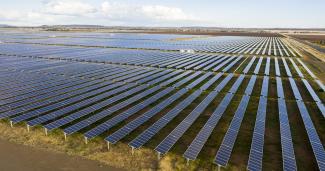Electricity generation from utility scale solar projects is growing rapidly in Australia. By December 2018, over 3000 MW of utility scale solar generation was connected to the electricity grid.
So what is utility scale solar?
Ryan Flack from solar power training partner, Global Sustainable Energy Solutions (GSES) says utility scale solar is defined by it’s end use.
“Utility scale solar systems have the potential to transform Australia’s power generation portfolio”, said Flack.
“The line between utility scale solar power and large-scale commercial solar power projects is drawn not necessarily by system size, but instead on the project’s end-use.
“Utility scale solar installations are built for the same reason that conventional power plants are – to produce power to be distributed on the electricity grid whereas commercial scale solar systems are primarily developed to reduce the operating costs of a business.”
“Although there are no strict rules defining what size plant constitutes ‘utility scale’, solar plants built for utility purposes may range from as small as 100kW all the way up to multi-megawatt installations."
Utility scale solar projects commissioned this year include the 6.2 MW Baroota Solar Farm in South Australia, 42.5 MW Collinsville Solar Farm in Queensland, and 100 MW Merredin Solar Farm in Western Australia*.
And of course there is the new project to build the world’s biggest solar farm – the $20 billion Australia-ASEAN Power Link including a 10 GW solar array over 15,000 hectares in the Northern Territory*.
Meanwhile, the cost of utility scale solar is falling.
“It has fallen dramatically in recent years from $135 per megawatt hour (MWh) in 2015 to an expected $44.50 – $61.50 per MWh in 2020."
Due to these financial drivers, the uptake of utility scale solar projects is expected to increase in the coming years along with the demand for utility scale design capability.
Join the next Solar Power webinar on 20 October to learn more about Utility Scale Solar.
*Data from from Clean Energy Council.
